

JULES VERNE

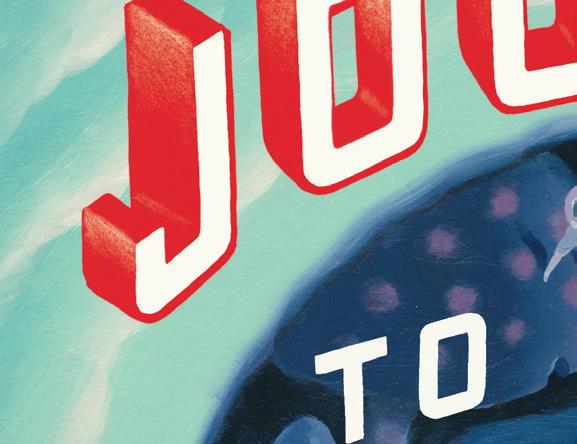
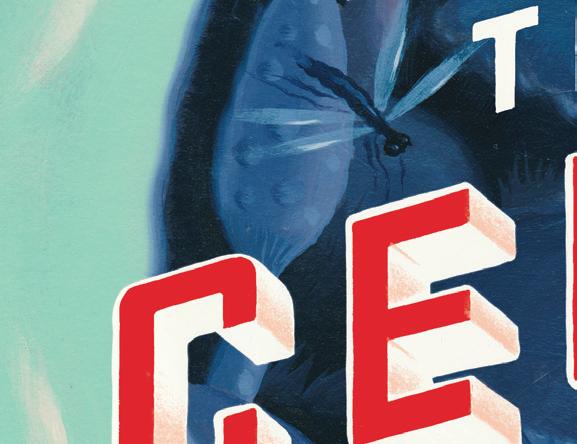
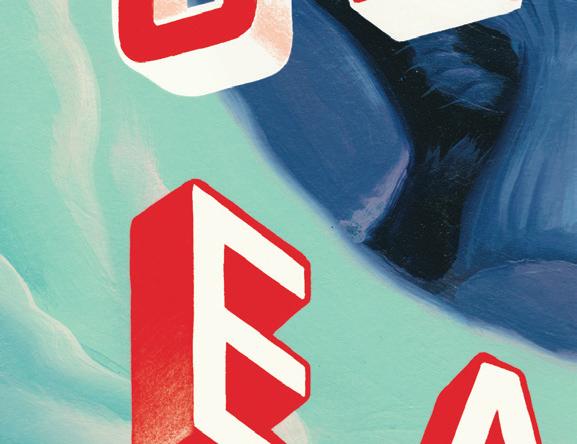


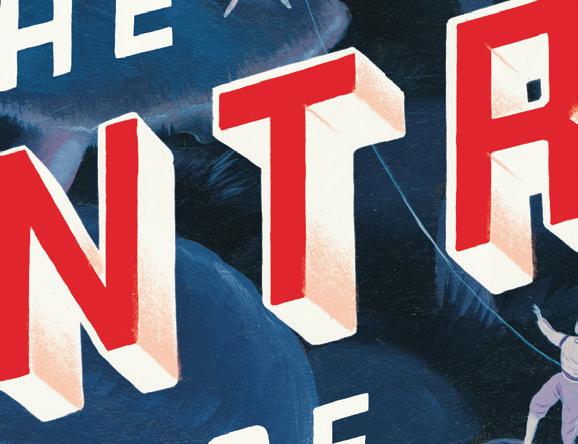
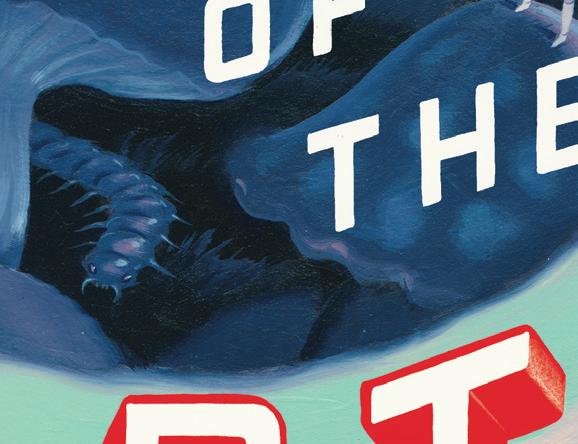



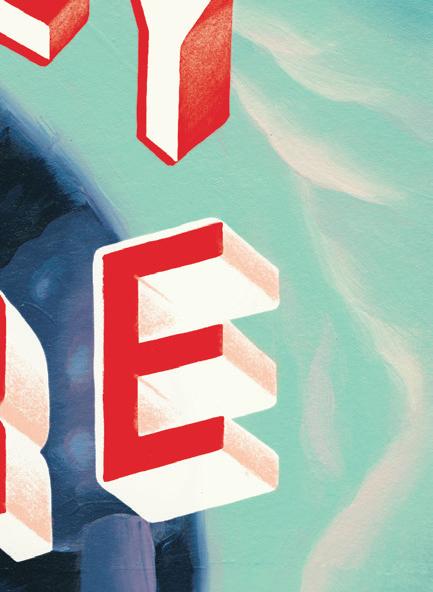

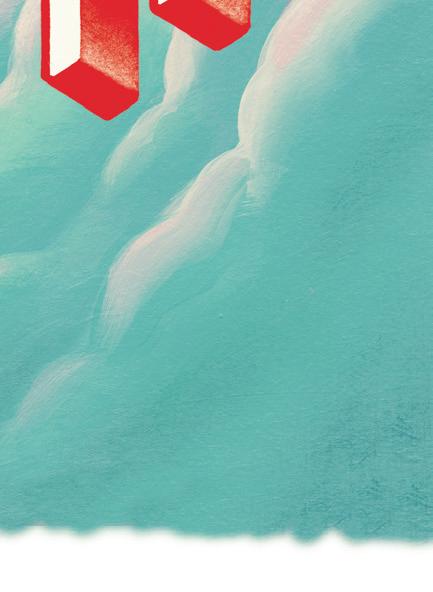
P UFFIN C LASSIC S

‘Oh, no!’ I c r ied, leaping to my feet. ‘My uncle mustn’t know about this! It would be the last st raw if he got to hear of a j our ne y of this sor t. He would want to follow suit, and nothing would stop him, he is such a f a n a t i c a l g e o l o g i s t . He w o u l d s e t o ff i n s p i t e of e ver ything, and he would take me w ith him, and we should ne ver come back. Ne ver! Ne ver!’
JULES VERNE

INTRODUCED BY
DIANA WYNNE JONES
Translated by R OBERT B ALDICK
Translated by R O BE RT B A L DIC K
DIANA WYNNE JONES
PUFFIN BOOKS
UK | USA | Canada | Ireland | Australia India | New Zealand | South Africa
Puffin Books is part of the Penguin Random House group of companies whose addresses can be found at global.penguinrandomhouse.com.
www.penguin.co.uk www.puffin.co.uk www.ladybird.co.uk
Voyage au Centre de la Terre first published in France 1864
This translation first published in Penguin Books 1965 First published in Puffin Books 1985 Reissued 2008, 2015
This edition published 2025
001
Copyright © Penguin Books, 1965
Introduction copyright © Diana Wynne Jones, 2008 Endnotes copyright © Penguin Books, 2008
Penguin Random House values and supports copyright. Copyright fuels creativity, encourages diverse voices, promotes freedom of expression and supports a vibrant culture. Thank you for purchasing an authorized edition of this book and for respecting intellectual property laws by not reproducing, scanning or distributing any part of it by any means without permission. You are supporting authors and enabling Penguin Random House to continue to publish books for everyone. No part of this book may be used or reproduced in any manner for the purpose of training artificial intelligence technologies or systems. In accordance with Article 4(3) of the DSM Directive 2019/790, Penguin Random House expressly reserves this work from the text and data mining exception.
Printed and bound in Great Britain by Clays Ltd, Elcograf S.p.A.
The authorized representative in the EEA is Penguin Random House Ireland, Morrison Chambers, 32 Nassau Street, Dublin d02 yh68
A CIP catalogue record for this book is available from the British Library
isbn: 978–0–241–73624–1
All correspondence to: Puffin Books, Penguin Random House Children’s One Embassy Gardens, 8 Viaduct Gardens, London sw11 7bw
Penguin Random Hous e is committed to a sustainable future for our business, our readers and our planet. is book is made from Forest Stewardship Council® certified paper.
introduction by
DIANA WYNNE JONES
Jour ne y to the Cent re of the Ear th is an astonishing book for many reasons. It cer tainly astonished me when I first read it at the age of ten – I couldn’t put it dow n, and I wouldn’t talk to anybody until I had finished it. It is one of the first pieces of science fiction ever w r itten and, at the same time, a thoroug hly exciting adventure stor y. It star ts, as all good adventures should, w ith a coded message that has to be deciphered before the journey can beg in; it has a sur pr ise ending; and it contains the first-ever mad professor, Otto Lidenbrock. Ever y other mad professor ever since is simply an imitation of this one. But you have to be patient when you read it. It was w r itten one hundred and for t y years ago, which means it is sometimes longw inded and old-fashioned, but I assure you it g ives good value in the end.
It is especially interesting to me because Jules Verne based his stor y on the theor ies of Humphr y Davy, the scientist who investigated the effects of laug hing gas and v
invented the lamps that miners wore fixed to the front of their helmets. Two hundred years ago, Davy lived in a house just around the corner from me. There was a big shed in the garden of this house where Davy did his exper iments – I can see it from my w indow – and local tradition has it that he used to test laug hing gas there on his fr iends, the poets Wordswor th and Coler idge among them, and all of them used to tr y it out once a week and laug h their heads off. They are knocking dow n this shed, ver y noisily, while I’m w r iting this, in order to build a new house. It occurs to me that Jules Verne mig ht have based his mad professor on the character of Humphr y Davy.
Davy had a lot to do w ith mining and he was conv inced, unlike most other scientists, that the centre of the ear th was not really made of hot, molten rock. He thoug ht it mig ht simply contain a lot of water. This is the theor y that Jules Verne uses. Professor Otto Lidenbrock believes this theor y w ith eccentr ic fer vour and drags Axel, his poor, protesting nephew, off into the depths of the ear th, where they do indeed find a lot of water. The g reat underg round ocean is absolutely unforgettable. But if you read carefully, you w ill see that Jules Verne hedges his bets a little here. The explorers never actually get r ig ht to the centre of the ear th. You think, So of course they never find molten rock! Then you think, Hang on! Nobody except mad Professor Lidenbrock has ever gone dow n there to look! Humphr y vi
Davy could be r ig ht after all. Like all good science fiction, this book really makes you think.
And here is another astonishing fact. When Jules Verne was a boy, he promised his mother he would never leave home – and he never did. He stayed in France and did all his explor ing by reading books. He travelled only in his mind. But such is the power of his imagination that, w h e n t h e t r ave l l e r s g e t to Ice l a n d a n d fi n a l l y p lu n g e underg round, you believe in what they find as if Jules Verne had been there himself and seen it w ith his ow n eyes. Jules Verne was an exper t mind traveller. Journey ing in his head, he w rote this and at least two other adventure stor ies that are world-famous to this day. Mar vellous.
Astonishing .
C o n t e n t s
My Uncle Lidenbrock
The Strange Parchment
My Uncle is Baffled
I Find the Key
Hunger Defeats Me
I Argue in Vain
Getting Ready
The First Stage
We Reach Iceland
Our First Dinner in Iceland
Our Guide Hans
Slow Prog ress
Icelandic Hospitalit y
A Final Argument
The Summit of Sneffels
Inside the Crater
Our Real Journey Beg ins
Ten Thousand Feet Below Sea-Level
Upwards Again
A Dead End
The New Columbus
I Collapse
We Find Water
Under the Sea
A Day of Rest
Alone
Lost and Panic-Str icken
I Hear Voices
Saved
An Underg round Sea
The Raft
We Set Sail
A Battle of Monsters
The Great Geyser
The Storm
An Unpleasant Shock
A Human Skull
The Professor Gives a Lecture
Man Alive
We Meet an O bstacle
Dow n the Tunnel
Going Up
Shot Out of a Volcano
Back to the Surface
Home Again
My Uncle Lide nbrock
On May , w h i ch w a s a Su n d ay, my u n cl e , Professor Lidenbrock, came rushing back towards his little house, No. Königstrasse, one of the oldest streets in the old quar ter of Hamburg . Mar tha must have thoug ht she was ver y behindhand, for the dinner was only just beg inning to sizzle on the kitchen stove.
‘Well,’ I said to myself, ‘if my uncle is hungr y he’ll make a dreadful fuss, for he’s the most impatient of men. ’
‘ P r o f e s s o r L i d e n b r o c k h e r e a l r e a d y ! ’ c r i e d p o o r Mar tha in astonishment, half op ening the dining-ro om do or.
‘Yes, Mar tha; but don’t wor r y if the dinner isn’t cooked, because it isn’t two o ’clock yet. St Michael’s clock has only just struck half past one. ’
‘ Then why is Professor Lidenbrock coming home?’
‘He’ll probably tell us himself.’
‘Here he is! I’m off, Mr Axel. You’ll get him to see reason, won’t you?’
laborator y.
I was left alone. But as for getting the most irascible of professors to see reason, that was a task beyond a man of my rather undecided character. So I was getting ready to beat a prudent retreat to my little room upstairs, when the st reet door creaked on its hinges, heavy footsteps shook the wooden staircase, and the master of the house, passing throug h the dining-room, rushed straig ht into his study.
But on his way he had found time to fling his stick w i t h t h e n u tc r a c ke r h e a d i n to a co r n e r, h i s b ro a dbr immed hat on to the table, and these emphatic words at his nephew : ‘Axel, follow me!’
Before I had time to move, the Professor called to me again in an impatient voice:
‘Well, haven’t you got here yet?’
I rushed into my formidable master’s study.
Otto Lidenbrock was not, I must admit, a bad man; but, unless he changes in the most unlikely way, he w ill end up as a ter r ible eccentr ic.
He was a professor at the Johannaeum and gave a course of lectures on miner alog y, dur ing e ver y one of which he lost his temper once or tw ice. Not that he cared whether his pupils attended regularly, listened attentively, or were successful later : these little matters interested him
only ver y slig htly. His teaching was what the Ger man philosophers would call ‘subjective’: that is to say it was intended for himself and not for others. He was a selfish scholar, a well of science whose pulle y creaked when you t r i e d to d r aw a
i s e r. T h
Ger many.
Un f o r t u n a te l y f o r h i m , my u n cl e h a d d i ffi c u l t y i n speaking fluently, not so much at home as in public, and this is a regrettable defect in an orator. Indeed, in his lectures at the Johannaeum the Professor would often stop shor t, struggling w ith a recalcitrant word which refused to slip between his lips, one of those words which resist, swell up, and finally come out in the rather unscientific form of a swear-word. This was what always sent him into a rage.
Now in mineralog y there are a great many barbarous terms, half Greek and half Latin, which are difficult to pronounce and which would take the skin off any poet’s lips. I don’t want to say a word against that science – far from it – but when one finds oneself in the presence of rhombohedral cr ystals, retinasphaltic resins, gehlenites, fangasites, molybdenites, tungstates of manganese, and titanite of zirconium, the nimblest to ngue may be forgiven for slipping.
This pardonable infirmity of my uncle’s was well know n in the tow n and unfair advantage was taken of it; the
students waited for the dangerous passages when he lost his temper and then burst out laughing, which is not in good taste, even in Germany. And if there was always a large audience at the Lidenbrock lectures, a great many of those present undoubtedly came w ith the chief object of amusing themselves at the spectacle of the Professor’s rages.
However that may be, my uncle, as I have said before and cannot repeat too often, was a true scholar. Although he sometimes broke his specimens by handling them too roughly, he combined the genius of the geologist w ith the eye of the mineralogist. With his hammer, his steel pointer, his magnetic needle, his blowpipe, and his bottle of nitric acid, he was a force to be reckoned w ith. From the fracture, appearance, hardness, fusibility, sound, smell, and taste of any g iven mineral, he could unhesitatingly class it in its proper place among the six hundred species know n to modern science.
The name of Lidenbrock was accordingly mentioned in to
Humphr y Davy, Humboldt, Captain Franklin, and General Sabine never failed to call on him when passing through Hamburg; and B e cquere l, Eb e lman, Brewster, D umas, Mi
Chemistr y.
Tr a n s c e n d e n t a l C r y s t a l l o g r a p h y b y P r o f e s s o r O t t o
L i d e n b ro ck h a d a p p e a re d a t Le i p z i g , a n i m p o s i n g f o l i o
vo lu m e w i t h p l a te s , w h i ch , h owe ve r, f a i l e d to cove r i t s ex p e n s e s .
Over and above all this, I should add that my uncle was the curator of the mineralog ical museum founded by Mr Struve, the Russian ambassador, a valuable collection know n all over Europe.
This, then, was the gentleman who was calling me so i m p a t i e n t l y. P i c t u re to yo u r s e l f a t a l l , t h i n m a n , i n excellent health, and w ith a fair, youthful complexion which took off a good ten of his fift y years. His big eyes were constantly rolling behind huge spectacles; and his l o n g t h i n n o s e l o o ke d l i ke t h e b l a d e o f a k n i f e . M i s c h i e vo u s s t u d e n t s , i n d e e d , a s s e r te d t h a t i t w a s
mag ne t ize d and att r a c te d iron fi ling s. This was she er calumny : it attracted nothing but snuff, thoug h that in g reat abundance.
When I have added that my uncle took mathematical str ides three feet long , and that as he walked along he kept his fists tig htly clenched, a sure sig n of an impetuous temperament, you w ill know him well enoug h not to hanker after his company.
He live d in his ow n little house in the König st r asse, a building w hich was half br ick and half wo o d, w ith an i n d e n t e d g a b l e ; i t o ve r l o o ke d o n e o f t h o s e w i n d i n g
canals w hich interse c t in the midd le of the oldest quar ter o f Ha m b u r g , w h i ch t h e g re a t fi re o f m e rc i f u l l y
spare d.
It i s t r u e t h a t t h e o l d h
l y per pendicular, and bulged out a little towards the street; its roof was slig htly askew, like the cap over the ear of a Tugendbund student; and the balance of its lines left something to be desired; but, all consider ing , it stood firm, thanks to an old elm which was solidly embedded in the façade and which in spr ing used to push its young sprays throug h the w indow panes.
My uncle was fairly well off for a Ger man professor. The house belonged to him, both the building and its contents – the latter including his goddaug hter Gräuben, a se venteen-year-old native of the Virlande, our good Mar tha, and myself. In my dual capacit y of nephew and or phan I became his labor ator y assistant.
I must admit that I took to geolog y enthusiastically ; I had the blood of a mineralog ist in my veins and I never felt bored in the company of my precious pebbles.
All in all, life was happy enoug h in that little house in the Königstrasse, in spite of the master’s fits of temper, for althoug h he was rather brusque w ith me he was fond of me all the same. But the man was incapable of waiting , and was always in a g reater hur r y than Nature. In Apr il, after he had planted seedling s of mig nonette or convolvulus in the ear thenware pots in his draw ing-room, he
would go regularly ever y morning and pull them by the leaves to make them g row faster.
With such an eccentr ic character, obedience was the only course to adopt. I therefore rushed into his study.
The St range Parchme nt
That study of his was a regular museum. Specimens o
fo u n d t h ere ,
, metallic, and lithoid miner als.
How well I knew them, those knicknacks of mineralogical science! How often, instead of frittering away my time with boys of my own age, I had enjoyed myself dusting those specimens of graphite, anthracite, coal, lignite, and peat! And those examples of bitumen, of resin, of organic salts which had to be protected from the smallest speck of dust! And those metals, from iron to gold, whose relative value was ignored in view of the absolute equality of scientific specimens! And all those stones which would have been enoug h to rebuild the whole Königst r asse house, and even add a splendid room which would have suited me admirably!
But as I went into the study, my mind was not on these wonders: my thoug hts were entirely occupied by my uncle.
He was ensconced in his big Utrecht velvet armchair, and was holding a book which he was consider ing w ith the profoundest admiration.
‘What a book!’ he was say ing .
T h i s e xc l a m a t i o n re m i n d e d m e t h a t Pro f e s s o r
Lidenbrock was also a bibliomaniac in his spare time; but a book had no value in his eyes unless it was unique or, at the ver y least, unreadable.
‘Well?’ he said. ‘Can’t you see what it is? It’s a pr iceless treasure that I found this morning , rummaging about in that Jew Hevelius’s bookshop.’
‘Splendid!’ I replied, w ith forced enthusiasm.
After all, why all this excitement about an old quar to volume whose covers seemed to be made of coarse calf, a yellow ish book w ith a faded seal hanging from it?
But for all that the Professor went on utter ing admir ing exclamations.
‘Look,’ he said, asking and answering his own questions. ‘Isn’t it beautiful? Yes, it’s splendid! And what a binding! Does it open easily? Yes, and it stays open at any page you like. But does it close well? Yes, for the binding and the leaves form a compact whole, with no gaps or openings anywhere. And look at the back, which doesn’t show a single crack after seven hundred years! Now there’s a binding Bozerian, Closs, or Purgold would have been proud of!’
Wh i l e s ay i n g a l l t h i s , my u n c l e ke p t o p e n i n g a n d shutting the old book. I could do no less than ask him
about its contents, althoug h as a matter of fact they did not interest me in the slig htest.
‘An d w h a t i s t h e t i t l e o f t h i s wo n d e r f u l wo r k ? ’ I a s ke d , w i t h a
s p e c i o u s .
‘ T h i s wo r k , ’
excitement, ‘is the He ims Kr ing la of Snor ro Turleson, the famous Icelandic w r iter of the twelfth centur y! It is the c h ro n i c l e o f t h
No
Iceland.’
‘Really?’ I cr ied, as hear tily as I could. ‘I suppose this is a translation?’
‘What!’ roared the Professor. ‘What would I be doing w ith a translation? This is the original work in Icelandic, that magnificent language which is both rich and simple and allows an infinite variety of grammatical combinations and verbal modifications!’
‘Like German,’ I suggested, not altogether unhappily.
‘Yes,’ replied my uncle, shrugg ing his shoulders; ‘not to mention the fact that Icelandic has three genders like Greek and declines proper nouns like Latin.’
‘Ah!’ I said, slig htly shaken in my indifference, ‘and is the t y pe good?’
‘ Ty pe! Who said any thing about t y pe, you w retched boy? Ty pe, indeed! Ah, you think it’s a pr inted book, do you? It’s a manuscr ipt, you idiot, a Runic manuscr ipt.’
‘Runic?’
‘Yes. Now I suppose you want me to explain what that means?’
‘Of course not,’ I replie d in an injure d voice. But my uncle to ok no not ice, and told me, ag ainst my w il l, a go o d many thing s I was not par t icular ly intereste d in lear ning .
‘The Runes,’ he said, ‘ were letters of an alphabet used in Iceland in olden times, and legend has it that they were invented by Odin himself. Look at them, irreverent boy, and admire these characters sprung from a god’s imagination!’
Not know ing what to say, I was going to prostr ate myself before the book – a response which must g ive pleasure to gods as well as to kings, for it has the advantage of never causing them any embar rassment – when a little incident occur red which changed the course of the conversation. This was the appearance of a dir t y piece of parchment which slipped out of the book and fell on the floor.
My
understandable eager ness. An old document, enclosed perhaps since immemor ial time between the pages of an old book, was bound to have immeasurable value in his eyes.
‘What’s this?’ he cr ied.
And at the same time he carefully unfolded on his table a piece of parchment five inches by three, containing a few lines of unintellig ible characters.
I reproduce them here in exact facsimile. I consider it impor tant to publish these str ange sig ns, for the y led Professor Lidenbrock and his nephew to under take the strangest expedition of the nineteenth centur y.

The Professor considered this ser ies of characters for a few moments; then, raising his spectacles, he said:
‘ These are Runic letters; they are absolutely identical w ith those in Snor ro Turleson’s manuscr ipt. But what on ear th do they mean?’
Since Runic letters struck me as something invented by scholars to mystify the unfor tunate world, I was not sor r y to see that my uncle could not make head or tail of them. At least that was what I supposed from his fingers, which had begun to tw itch ter r ibly.
‘And yet it must be old Icelandic!’ he muttered between his teeth. And Professor Lidenbrock must have know n, for he was reputed to be a regular polyg lot. Not that he could speak fluently all the two thousand languages and
four thousand dialects used on this ear th, but at least he was familiar w ith a good many of them.
Faced w ith this difficult y, he was obv iously going to lose his temper, and I was steeling myself for a v iolent scene when the little clock on the mantelpiece struck two.
At that moment Mar tha opened the study door, say ing:
‘ The soup is ready.’
‘ To hell w ith the soup, ’ cr ied my uncle, ‘and her that made it, and them that dr ink it!’
Mar tha took to her heels. I ran after her and, scarcely know ing how I got there, I found myself sitting in my usual place in the dining-room.
I waited for a few minutes. There was no sig n of the Professor. It was the first time, to my knowledge, that he had missed his dinner. And what a dinner it was! Parsley soup, a ham omelette seasoned w ith sor rel, veal w ith prune sauce, and, for desser t, sugared praw ns, the whole accompanied by an excellent Moselle w ine.
All this my uncle was going to miss on account of a scrap of old parchment! Naturally, as a devoted nephew, I considered it my dut y to eat for him as well as for myself, and I car r ied out this dut y conscientiously.
‘I’ve never know n such a thing , ’ said Mar tha. ‘Professor Lidenbrock not at table!’
‘Unbelievable, isn’t it?’
‘It means that something ser ious is going to happen!’ said the old ser vant, wagg ing her head.
In my opinion it meant nothing at all, except perhaps a dreadful scene when my uncle found that his dinner had been eaten.
I had come to my last praw n when a stentor ian voice tore me away from the pleasures of desser t. With one bound I went from the dining-room to the study.
My Uncle is B affled
t’s d e fi n i t e l y Ru n i c , ’ s a i d t h e Pro f e s s o r, f row n i n g .
‘ Bu t t h e re i s a s e c re t to i t w h i ch I m e a n to d i s cove r, o r e l s e . . .
‘Sit dow n there,’ he added, extending his fist towards the table, ‘and get ready to w r ite.’
In an instant I was ready.
‘Now, I am going to dictate to you the letters of our alphabet which cor respond to these Icelandic characters. We shall see what that g ives us. But by St Michael, be careful not to make a mistake!’
The dictation began, I was as careful as I could be. The letters were called out one after another, and together they formed this incomprehensible succession of words:
m.r nlls esreuel seecJde sgtssmf unte ief niedrke kt,samn at rateS Saodr r n emtnaeI nuaect r r ilSa
Atvaar .nsc rc ieaabs
ccdr mi eeutul frantu dt,iac ose ibo KediiY
When I had finished, my uncle snatched up the paper upon which I had been w r iting and examined it closely for a long time.
‘What does it mean?’ he kept repeating mechanically. Upon my honour I could not have told him. In any case he was not asking me, and he went on talking to himself.
‘It’s what they call a cr y ptog ram, ’ he said, ‘in which the sense is concealed by a de liberate jumbling of the letters, which would make an intellig ible sentence if they were cor rectly rear ranged. To think that I may have here the clue to some g reat discover y!’
For my par t I thoug ht there was absolutely nothing there, but I prudently kept my opinion to myself.
Then the Professor took the book and the parchment, a n d com p a re d t h em . ‘ T h e y a ren’t i n t h e s a m e h a n dw r iting , ’ he said. ‘ The cr y ptog ram is of a later date than the book, and I can see indisputable proof of that r ig ht at the beg inning . The first letter is a double m, a letter you would look for in vain in Turleson’s book for it was only added to the Icelandic alphabet in the four teenth centur y. So there are at least two hundred years between the book and the document.’
That, I admit, struck me as a log ical conclusion.
‘I am therefore led to think,’ continued my uncle, ‘that
one of the ow ners of this book w rote these myster ious letters. But who the dev il was that ow ner? Wouldn’t he have w r itten his name somewhere on this manuscr ipt?’
My uncle raised his spectacles, picked up a powerful magnifying glass, and carefully examined the first pages of the book. On the back of the second page, the one bearing the subtitle, he noticed a sor t of stain which looked like a blot of ink. However, looking at it closely, he made out a few half-obliterated letters. My uncle realized that this was the interesting point, and he laboured at the stain until, w ith the help of his magnifying glass, he ended up by distinguishing the follow ing Runic characters, which he read out w ithout hesitation:
‘Arne Saknussemm!’ he cr ied tr iumphantly. ‘Why that’s a name, and what is more an Icelandic name, that of a famous alchemist of the sixteenth centur y!’
I looked at my uncle with a certain admiration. ‘Those alchemists,’ he went on, ‘Avicenna, Bacon, Lully, Paracelsus, were the real scientists, indeed the only scientists, of their time. They made the most astonishing discoveries. Why shouldn’t this Saknussemm have concealed some surprising invention behind this incomprehensible cr y ptogram? That must be it. That is it.’
The Professor’s imagination took fire at this idea.
‘No doubt,’ I ventured to reply. ‘But what interest could this scientist have had in hiding a wonderful discover y in this way?’
‘What indeed? How should I know? Didn’t Galileo do the same about Saturn? Anyway, we shall see: I’m going to discover the secret of this document, and I shall neither eat nor sleep until I have guessed it.’
‘Oh!’ I thoug ht to myself.
‘Nor w ill you, Axel,’ he added.
‘Good Lord!’ I thoug ht, ‘it’s a good thing I ate two dinners today!’
‘First of all,’ said my uncle, ‘ we must find the key to this cipher. That oug ht not to be difficult.’
At these words I looked up quickly. My uncle went on talking to himself.
‘Nothing could be easier. In this document there are letters, namely sevent y-nine consonants and fift y-three vowels. This is roug hly the propor tion found in southern languages, while nor thern idioms are infinitely r icher in consonants. Consequently this is w r itten in a southern language.’
These conclusions struck me as ver y reasonable.
‘But what language is it?’
Here I waited for a display of learning , but instead my uncle showed himself to be a master of analysis.
‘ This Saknussemm,’ he went on, ‘ was an educated man,
so when he was not w r iting in his mother tongue, he would naturally w r ite in the language commonly used by educated men in the sixteenth centur y, namely Latin. If I am w rong , I can go on to tr y Spanish, French, Italian, Gre e k , a n d He b re w. Bu t t h e
centur y generally w rote in Latin, so that I am entitled to say, a pr ior i, that this is Latin.’
I sat up w ith a jolt. My memor ies of Latin rose in revolt at the idea that this st r ing of bar barous words could belong to the sweet language of Virg il.
‘Yes, this is Latin,’ my uncle continued, ‘but Latin in a scrambled form.’
‘Well,’ I thoug ht to myself, ‘if you can unscramble it, my dear uncle, you are a clever man. ’
‘Let us have a good look at it,’ he said, picking up the sheet of paper on which I had w r itten. ‘Here is a ser ies of letters in apparent disorder. There are some words consisting of consonants only, like the first, mm.r nlls; others, on the other hand, in which vowels predominate, such as the fifth, unte ief, or the last but one, ose ibo. Now t h i
occur red mathematically in obedience to the unknow n law which has governed the order of these letters. It seems to me quite cer tain that th e or ig inal sentence was w r itten i n a re g u l a r m a n n e r, a
accordance w ith a law which we have yet to discover. Whoever possessed the key to this cipher would be able
to read it fluently. But what is that key? Axel, have you got it?’
To this question I made no reply, and for a ver y good reason. My eyes had fallen on a charming picture hanging on the wall, the por trait of Gräuben. My uncle’s ward was at Altona at that time, staying w ith one of her female relations, and her absence made me ver y sad, for, as I can now confess, the pretty Virlandaise and the Professor’s n e p h e w l ove d
tr anquillit y of the Ger man char acter. We had become eng age d, unknow n to my uncle, w ho was to o de eply absorbed in his geolog y to understand such feelings as ours. Gräuben was a lovely blue-eyed blonde, who was rather solemn and serious-minded but loved me none the less for that. For my par t, I adored her, and so the picture of my little Virlandaise transferre d me in a single instant from the world of realities to that of dreams and memories. I recalled the faithful companion of my work and my pleasures. Ever y day she used to help me to ar range my u n c l e ’ s p re c i o
together. Oh, Gräuben was an accomplished mineralog ist; she could have taug ht a few things to many a savant. She l ove d
p roblems. What pleasant hours we had spent study ing together, and how often I had env ied the lot of those insensible stones which she handled w ith her charming fingers!
Then, when our recreation time came, we used to go out together, strolling along the shady walks of the Alster and going together to the old tar red w indmill which looks so picturesque at the end of the lake. On the way we would chat together, hand in hand, and I would tell her stor ies which made her laug h. Eventually we would come to the banks of the Elbe, and, after say ing good-bye to the swans g liding about among the big water-lilies, we would return to the quay by the steamer.
That was where I had got to in my dream when my u n c l e , t h u m p i n g t h e t a b l e w i t h h i s fi s t , b ro u g h t m e abruptly back to ear th.
‘Look here,’ he said, ‘the first idea which would occur to anybody wanting to mix up the letters in a sentence would be to write the words vertically instead of horizontally.’
‘It wouldn’t have occur red to me , ’ I thoug ht.
‘Now let’s see how that works. Axel, w r ite dow n any sentence that comes into your head on this scrap of paper ; only, instead of ar ranging the letters in the usual way, one after another, put them in ver tical columns, so as to get five or six.’
I understood what he wanted and immediately w rote the follow ing lines of letters:
vehalb er,ree yymlGn
‘Good!’ said the Professor, w ithout reading what I had w r itten. ‘Now set out these g roups of letters in a hor izontal line.’
I obeyed, and obtained the follow ing result:
Iomy ir luudtä ovcetu vehalb er,ree yy mlGn
‘Splendid!’ said my uncle, snatching the paper out of my h a n d s . ‘ T h i s a l re a d y l o o k s r a t h e r l i ke t h e o l d document: the vowels and consonants are g rouped in the same haphazard way, and there are e ven capitals and commas in the midd le of words, just as there are in Saknussemm’s parchment!’
I couldn’t help thinking that what he said was extremely ingenious.
‘Now,’ my uncle went on, looking straig ht at me, ‘to read the sentence which you have just w r itten, and w ith which I am completely unfamiliar, all I need to do is to take the first letter of each word, then the second letter, and so on. ’
And my uncl e, to his g reat sur pr ise, and even more to mine, read out:
‘I love you ver y much, my dear little Gräuben.’
‘What’s this?’ said the Professor.
Yes, w ithout know ing what I was doing , silly, lovesick yo u n g m a n t h a t I w a s , I h a d w r i t te n d ow n t h a t compromising sentence.
‘Ah! So you are in love w ith Gräuben?’ said my uncle, in a suitable voice for a guardian.
‘Yes! No!’ I stammered.
‘ S o yo u a re i n l ove w i t h G r ä u b e n , ’ h e re p e a te d automatically. ‘Well, now let’s apply my method to the document in question.’
Returning to the consideration of his absor bing theor y, my u n cl e h a d a l re a dy f o r go t te n my i m p r u d e n t wo rd s . I say imprudent because the savant’s learned head was incapable of understanding matters of the hear t. But luckily the impor tant matter of the document car r ied the day.
As he got rea dy to car r y out his cr ucial exp er iment, P r o f e s s o r L i d e n b r o c k ’ s e y e s d a r t e d fl a s h e s o f l i g h t throug h his sp e c ta cles. His fi ngers t remble d as he picke d up the old parchment. He was de eply move d. At last he g ave a loud coug h, and in a solemn voice, rea ding out i n s u cce s s i o n t h e fi r s t l e t t e r o f e a c h wo rd , t h e n t h e se cond, and so on, he dic tate d the fol low ing ser ies to me:
messunkaSenrA.icefdoK.segnittamur tn ecer tser rette,rotaivsadua,ednecsedsadne
lacartniiiluJsirat racSarbmutabiledmek
meretarcsilucoYsleffenSnI
I must admit that when I came to the end I felt ver y excited; these letters, called out one after another, had conveyed no meaning to my mind, but I expected the Professor to pronounce a mag nificent Latin sentence.
To my astonishment, a v iolent blow from his fist made the table rock on its legs. The ink spur ted into the air, and the pen flew out of my hand.
‘ That can’t be it!’ exclaimed my uncle. ‘It doesn’t make sense!’
Then, fly ing across the study like a cannonball, and descending the stairs like an avalanche, he rushed out into the Königstrasse and disappeared as fast as his legs could car r y him.
I Find the Ke y
’
kitchen as the street door slammed shut, shaking the whole house.
‘Yes,’ I replied, ‘well and truly gone!’
‘Well I never! And what about his dinner?’ asked the old ser vant.
‘He won’t have any. ’
‘And his supper?’
‘He won’t have any. ’
‘What?’ cr ied Mar tha, clasping her hands.
‘ No, Ma r t h a , h e ’ s n o t g o i n g to e a t a t h i n g , n o r i s anybody else in this house. Uncle Lidenbrock is going to star ve us all until he has succeeded in decipher ing an old scrawl which is absolutely indecipherable.’
‘Goodness g racious! You mean we shall have to star ve to death?’
I did not dare to admit that, w ith a man as determined as my uncle, this fate struck me as inev itable.
The old ser vant, ser iously alarmed, went back to her kitchen g roaning to herself.
Once I was alone, the idea occur red to me of going to tell the whole stor y to Gräuben. But how could I leave the house? The Professor mig ht return at any moment. And what if he called me? What if he wanted to go on w ith this logog r y phic r iddle which would have baffled even old Oedipus? And if I failed to answer his call, what mig ht happen then?
The w isest thing to do was to remain where I was. As it happened, a mineralog ist at Besançon had just sent us a collection of siliceous geodes which had to be classified. I set to work, sor ting , labelling , and ar ranging in their ow n g lass case all these hollow stones, each w ith a set of little cr ystals inside it.
But this task did not absor b the whole of my attention. The business of the old document continued to preoccupy me. My head was throbbing and I felt overcome by a vague anxiet y. I had a presentiment of some imminent catastrophe.
After an hour’s work my geodes were all neatly ar ranged on their respective shelves. I then dropped into the old Utrecht armchair, my head throw n back and my arms dang ling . I lit my long cur ved pipe, whose bowl was car ved in the shape of a reclining naiad, and then amused myself by watching the car bonizing process which was g radually turning my ny mph into a neg ress. Ever y now and then I
